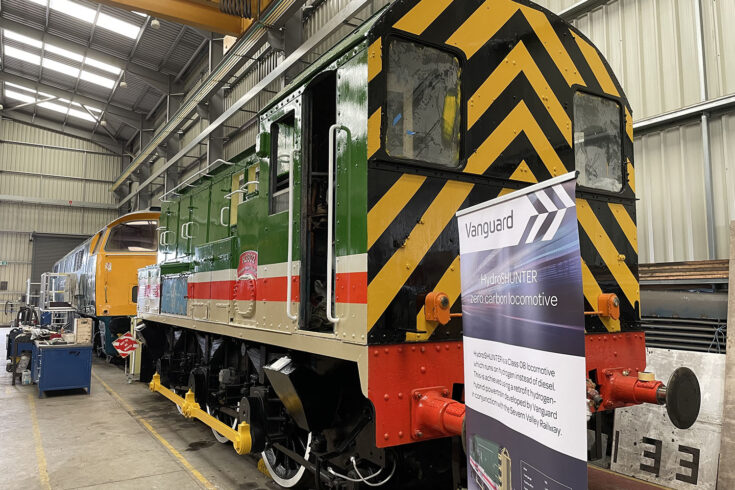Clean mobility experts, Vanguard Sustainable Transport Solutions (STS), head up a partnership of sector specialists to develop hydrogen-fuelled trains and help accelerate their adoption.
Diesel-powered trains continue to be an environmental and productivity issue in the wider transport system, creating an emissions, maintenance and operational opportunity to be addressed.
The need for the adoption of alternative power sources is essential, along with a shift in engineering expertise and sector engagement in future technology.
Managed exchangeable solid state fuel storage technology for rail vehicles
This new project will showcase the performance, technology and opportunity of train stock powered by a solid-state hydrogen fuel cell.
The project will use retrofitted freight trains to house a novel hydrogen fuel storage system that works in conjunction with the existing motor components. Alongside this, an onsite fuel distribution and management system will be developed to provide the necessary hydrogen supply for this use case.
The project will not only bring the associated emissions benefits of fuel replacement, but will also provide viable solutions around upskilled engineering opportunities, power supply certainty and management, and industry engagement in new solutions.
The project scope

Transforming high-speed rail logistics.
Credit: Vanguard STS
The project is headed up by Vanguard STS, in association with the University of Birmingham and a select group of rail operators, asset owners, energy and engineering experts from across the rail sector and beyond.
Following the completion of the design stage of the concept, the project will move onto building the technology to be demonstrated.
Under the project, a heritage railway in Kidderminster, West Midlands will be the base for testing of a hydrogen-powered shunting locomotive. This will operate representative test trains to test the success of the hydrogen storage and supply, which is at a lower pressure than conventional hydrogen storage.
The project will run against existing operations to gain valuable data to showcase its operational promise, in addition to the fuel and emission savings figures gained from its use.
Results will also be used to generate material to demonstrate the safety and viability of the power supply, and to encourage customer uptake and greater industry partnership, collaboration and investment in the concept.
Aims and ambitions
The project’s central aim is to build and run a successful train that can replicate the performance of a current diesel-powered train. Having this proof of concept will then open doors to wider adoption and greater industry engagement.
Beyond this, the project aims to demonstrate the technological benefits that the fuel cell power brings. With diesel engine parts on older rolling stock becoming obsolete, changing to the hydrogen-run system brings an opportunity for existing stock to be used for longer by operators. The new technology also brings with it the opportunity to develop new engineering expertise for its installation and use, while its durability allows for less-regular maintenance requirements, and therefore cost savings.
When it comes to the hydrogen supply itself, the project expects to be able to demonstrate self-sufficiency from the fuel management system at the test site.
Requiring only water and green electricity to generate the hydrogen required, without transportation from existing hydrogen supply sites, the project aims to gather data, and insights into the opportunity for hydrogen production without the need to transport it to rail sites.
When brought together, these aims ultimately combine to increase uptake and engagement, as Ben Aitken, Project Manager at Vanguard STS, comments:
After the work we have undertaken with our partners to design the solid-state fuel cell system, we are now ready to move towards its real-world production and commercialisation. The funding from Innovate UK has been key to helping us on this journey, allowing us to expand our team and bring the technology to life in this initial use case.
The funding and wider support has also been important in showing government backing to the concept and helping us to connect with customers and industry stakeholders to gather their insights and engagement.
We want to combat the misinformation and stigma of working with low-pressure hydrogen power and prove its safety when compared to diesel fuel engines, as well as its performance benefits and net zero rewards for the rail sector and beyond.
About the funding
This project was funded as part of the ‘Zero emission propulsion collaborative research and development’ funding opportunity, funded by Innovate UK and launched in October 2022. Through this funding opportunity, £9.4 million was allocated to 15 projects from across the UK.
As part of the ‘Future economy net zero’ programme, this funding opportunity focused on future propulsion technologies for the transport sector. The programme will support the government’s drive for zero emission transport and systems as part of the net zero commitment for 2050.
This project is just one example of how Innovate UK and its partners are investing to realise the vision for rail in the Transport Vision 2050 strategy document. This sets out what the UK transport system may look like in 2050, and outlines the likely steps along the way to achieving this.
Innovate UK and its partners are currently investing around £700 million in the current three-year spending review period in transport programmes covering the pathways set out in the Transport Vision document.

